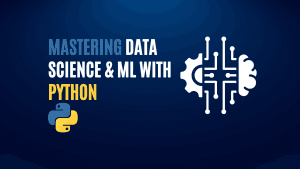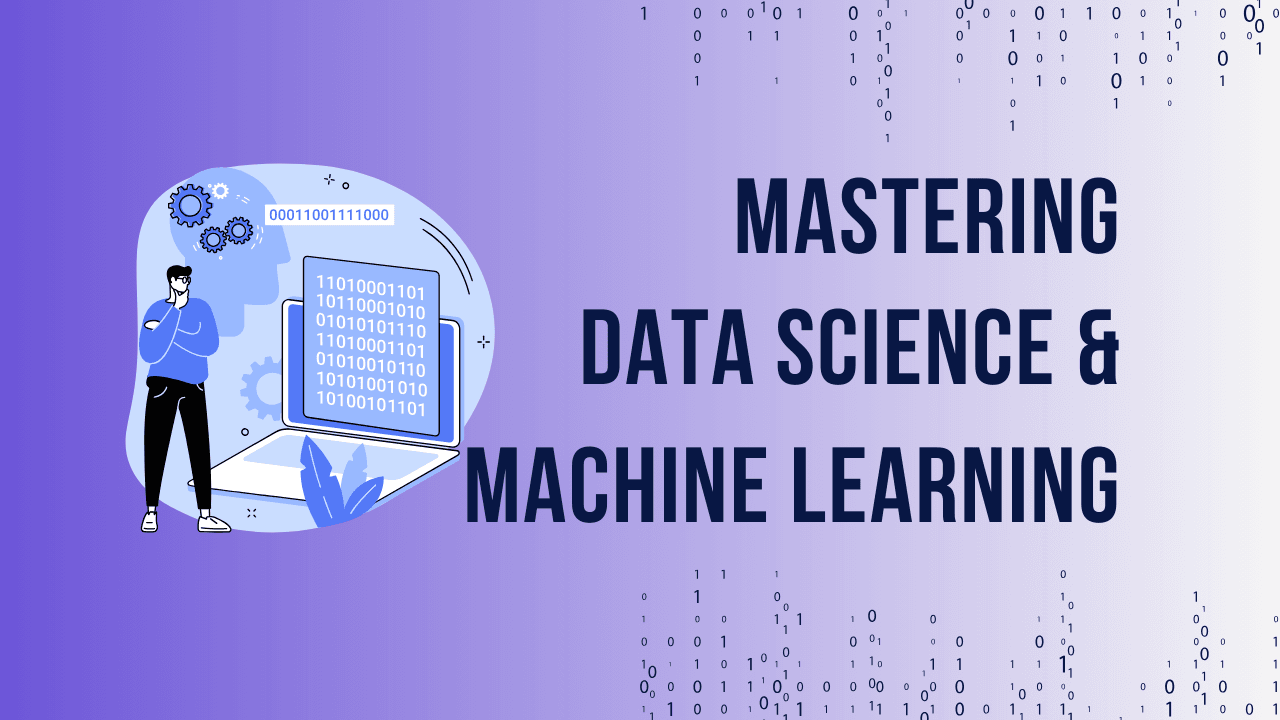The rapid growth of artificial intelligence (AI) and machine learning (ML) has led to a significant interest in these fields among students, professionals, and businesses. However, a common question arises: Is it necessary to learn Data Science before diving into AI and ML? This article will explore the importance of a solid Data Science foundation before embarking on the journey of learning AI and ML, highlighting the critical role Data Science plays in the success of these technologies.
Ready to take you Data Science and Machine Learning skills to the next level? Check out our comprehensive Mastering Data Science and ML with Python course.
Understanding Data Science
Definition of Data Science
Data Science is a multidisciplinary field that focuses on extracting valuable insights from structured and unstructured data through various techniques, including statistics, data analysis, and machine learning. It is the backbone of many modern technologies and plays a crucial role in driving data-driven decision-making.
Key Components of Data Science
Data Science encompasses several key components, such as data collection, data processing, statistical analysis, and data visualization. These components work together to help professionals make sense of large datasets and derive meaningful insights.
Role of Data Science in Modern Technology
In today’s data-driven world, Data Science is integral to various industries, including finance, healthcare, e-commerce, and more. It enables businesses to make informed decisions, optimize operations, and predict future trends.
Ready to take you Data Science and Machine Learning skills to the next level? Check out our comprehensive Mastering Data Science and ML with Python course.
Introduction to Machine Learning and AI
What is Machine Learning?
Machine Learning is a subset of AI that focuses on creating algorithms and models that enable computers to learn from and make decisions based on data. It is widely used in applications such as image recognition, natural language processing, and recommendation systems.
Understanding AI and Its Various Branches
AI is a broader concept that encompasses Machine Learning and other technologies such as deep learning, natural language processing, and robotics. AI aims to create systems that can perform tasks typically requiring human intelligence.
Relationship Between AI, ML, and Data Science
Data Science, AI, and Machine Learning are closely intertwined. Data Science provides the tools and techniques necessary for processing and analyzing data, which in turn feeds into AI and ML models to enhance their accuracy and efficiency.
Ready to take you Data Science and Machine Learning skills to the next level? Check out our comprehensive Mastering Data Science and ML with Python course.
The Prerequisites for Learning Machine Learning and AI
Importance of Foundational Skills
Before diving into Machine Learning and AI, it’s essential to have a strong foundation in key subjects, including mathematics, programming, and statistics. These skills are critical for understanding the algorithms and models used in AI and ML.
Core Subjects Necessary for ML and AI
A solid understanding of subjects like linear algebra, calculus, probability, and statistics is crucial for success in AI and ML. Additionally, programming languages such as Python and R are commonly used for implementing AI/ML models.
How Data Science Fits into the Learning Path
Data Science acts as a bridge between theoretical knowledge and practical application in AI and ML. By mastering Data Science, learners can better understand data processing, model building, and analysis, which are essential for AI and ML projects.
Data Science Basics Before AI and ML
Key Data Science Skills for AI and ML
To excel in AI and ML, it’s important to develop key Data Science skills such as data wrangling, statistical analysis, and data visualization. These skills enable professionals to handle large datasets effectively and derive insights that drive AI/ML models.
Understanding Data Processing and Cleaning
Data processing and cleaning are critical steps in the Data Science pipeline. Properly processed data ensures that AI and ML models are trained on accurate and relevant information, leading to better performance and outcomes.
The Importance of Statistical Knowledge in Data Science
Statistical knowledge is fundamental to Data Science, as it allows professionals to analyze and interpret data correctly. This understanding is essential for building accurate AI and ML models that can make reliable predictions.
Should I Learn Data Science First Before ML?
Pros and Cons of Learning Data Science First
Learning Data Science first offers a comprehensive understanding of data, which is crucial for AI and ML. However, it may require additional time and effort. On the other hand, skipping Data Science might lead to quicker results but at the cost of depth and accuracy.
How Data Science Knowledge Enhances ML and AI Skills
A strong foundation in Data Science enhances ML and AI skills by providing a deep understanding of data, enabling professionals to build more accurate and efficient models. It also improves problem-solving abilities and decision-making.
Alternative Learning Paths and Their Risks
While some learners may choose to dive directly into AI and ML, bypassing Data Science, this approach carries risks, such as a lack of understanding of data processing and analysis. This can lead to suboptimal outcomes in AI/ML projects.
Ready to take you Data Science and Machine Learning skills to the next level? Check out our comprehensive Mastering Data Science and ML with Python course.
Learning Data Science vs. Jumping Into AI
Comparative Analysis of the Two Approaches
Learning Data Science before AI offers a more thorough understanding of data, leading to better outcomes in AI/ML projects. In contrast, jumping directly into AI may result in quicker initial results but can lead to long-term challenges.
Long-Term Benefits of a Data Science Foundation
A strong foundation in Data Science provides long-term benefits, including better data handling, improved model accuracy, and enhanced problem-solving skills. These advantages contribute to the overall success of AI/ML projects.
Risks and Limitations of Bypassing Data Science
Bypassing Data Science can lead to risks such as poor data quality, inaccurate models, and a lack of understanding of the data. These issues can undermine the effectiveness of AI/ML projects and limit their potential.
Can You Do AI Without Learning Data Science First?
Situations Where Data Science May Be Bypassed
In some cases, Data Science may be bypassed, such as when using pre-built AI/ML models or working with small, clean datasets. However, this approach is not recommended for complex projects.
The Impact on Performance and Outcomes
Skipping Data Science can negatively impact the performance and outcomes of AI/ML projects. Without a solid understanding of data, models may be inaccurate, and results may be unreliable.
Examples of When Skipping Data Science Might Work
In scenarios where data is already clean and well-structured, or when using pre-built models, skipping Data Science may be feasible. However, these cases are exceptions rather than the norm.
The Role of Data in AI and ML Success
Importance of Quality Data in AI/ML
Quality data is critical to the success of AI and ML projects. Data Science ensures that data is accurate, relevant, and well-processed, leading to better model performance and more reliable outcomes.
How Data Science Ensures Data Integrity
Data Science plays a crucial role in maintaining data integrity by cleaning, processing, and validating data before it is used in AI/ML models. This ensures that the models are built on high-quality data.
The Connection Between Data Science and Model Accuracy
Model accuracy in AI and ML is directly linked to the quality of the data used. Data Science provides the tools and techniques necessary to ensure that data is accurate, leading to more reliable and accurate models.
Ready to take you Data Science and Machine Learning skills to the next level? Check out our comprehensive Mastering Data Science and ML with Python course.
Conclusion
In conclusion, a strong foundation in Data Science is essential for success in AI and ML. It provides the necessary skills for data processing, model building, and analysis, leading to more accurate and reliable outcomes.While it is possible to learn AI and ML without a Data Science background, doing so may result in suboptimal outcomes. Data Science provides the tools and knowledge necessary to excel in AI and ML, making it a critical component of the learning journey.
FAQ-Do I need to learn data science before ML and AI?
1. Why is it important to learn Data Science before diving into AI and Machine Learning?
Learning Data Science first provides a strong foundation in data handling, statistical analysis, and data processing, which are crucial for building accurate and effective AI and Machine Learning models. Without this knowledge, you might struggle with understanding and analyzing the data, leading to suboptimal outcomes.
2. Can I skip learning Data Science and directly start with AI and Machine Learning?
While it’s possible to start directly with AI and Machine Learning, skipping Data Science can lead to challenges, such as poor data quality, inaccurate models, and a lack of understanding of the data. A solid Data Science foundation ensures better performance and success in AI and ML projects.
3. What are the key Data Science skills required for success in AI and Machine Learning?
Key skills include data cleaning, statistical analysis, data visualization, and data wrangling. These skills help in handling large datasets, building accurate models, and deriving actionable insights from the data.
Our Students Testimonials:
Ready to take you Data Science and Machine Learning skills to the next level? Check out our comprehensive Mastering Data Science and ML with Python course.



